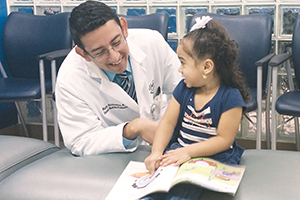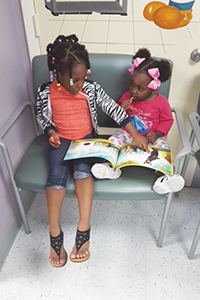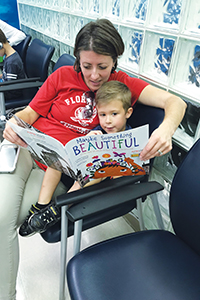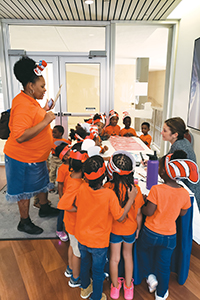By JULIE MINDA
Research shows that childhood literacy correlates with academic and career success and with improved health and well-being, even into adulthood. So, the low literacy rates common among children in many low-income communities have far-reaching implications.

Dr. Mario Hernandez of the Holy Cross Hospital Medical Group reads to a patient at a pediatric clinic in Fort Lauderdale, Fla.
This is according to information from Holy Cross Hospital in Fort Lauderdale, Fla. As part of its community benefit work, the hospital helps to promote literacy among children.
Kim Saiswick, vice president of community health and well-being for Holy Cross, points out education is a social determinant of health that also is tied to other social determinants connected to healthfulness, such as income, housing and transportation.
Golden (book) correlations
Holy Cross is located in Broward County, where 20 percent of children live in poverty, 25 percent receive free lunch by virtue of their family's income and more than 30 percent are uninsured. About 45 percent of the county's third-graders read below proficiency level, based on the Florida Standards Assessment.
According to information summarized by the Annie E. Casey Foundation in a 2010 report, reading proficiency by third grade —often defined as the ability to read independently and fluidly — is the most important predictor of high school graduation and career success. Studies show that children who can read by third grade have a decreased chance of being delinquent and of serving jail time later in life.
Research shows that children from birth through age 5 who are oriented toward literacy — through talking, reading and singing, for instance — are more likely to meet developmental milestones. And as compared to their literate peers, people who are illiterate in adolescence are more likely to engage in unhealthy behaviors and have an increased risk of incarceration.
Adults who can't read are more likely to experience chronic illness. Illiteracy correlates with shortened life expectancies.
Saiswick notes that adults who can't read may have limited health care knowledge and find it challenging to follow a doctor's orders because they cannot refer to written instructions.

Sisters pass the time with a picture book at the Fort Lauderdale clinic.
Talking is teaching
Research presented in the Family and Community Engagement 2013 Research Compendium shows that 61 percent of low-income children have no children's books at home. And, by age 3, children from low-income homes have heard about 30 million fewer words than children from middle- and upper-income homes, according to other studies, including one covered in the book Meaningful Differences in the Everyday Ex–perience of Young American Children by researchers Betty Hart and Todd R. Risley.
The efforts of Holy Cross physicians and staff to reduce the literacy gap start with parents of babies born at the hospital. Through the "Blessed Beginnings: Talking is Teaching" program, Holy Cross' maternal and child health department staff encourages parents and other family members to talk, read and sing to their new babies, as these activities have been found to match with successful development and later school success.
Holy Cross' medical group takes part in a national, evidence-based program called "Reach Out and Read" through which primary care physicians and pediatricians talk to parents during their children's well visits about the importance of reading to their kids. The clinicians also give free books to all their 4- and 5-year-old patients. This year's book giveaway is Thank You, Omu! There are plans to expand the program to distribute more titles, so kids can build a book collection at home.
Many Holy Cross clinicians and staff also volunteer for one-on-one, web-based weekly tutoring sessions with a first-grader. The hospital says the personal attention of a caring adult reading stories and encouraging a child through learning exercises "has a huge impact." The pairings are coordinated through United Way.

Holy Cross Hospital put copies of Maybe Something Beautiful: How Art Transformed a Neighborhood in its pediatric waiting rooms as part of its participation in the "Read for the Record" initiative in Broward County, Fla.
Return on investment
Holy Cross has prioritized childhood literacy in its community benefit and outreach programming for more than a decade. Saiswick estimates the hospital has spent about $100,000 so far, and adds, "the amount of time, energy, and love that goes into the program is huge by comparison to the actual cost."
Holy Cross' "Project Book" initiatives include a monthly in-person book club for students in elementary through high school grades run by Vanessa Graham, a community outreach representative. Most of the participants are between age 8 and 11. Graham selects a title that appeals to a wide age range of children, such as something from the Diary of a Wimpy Kid series. The library offers tutoring for students struggling with reading.
Holy Cross' annual Dr. Seuss-themed event draws hundreds of preschoolers for fun activities. Each child gets a Dr. Seuss book as a gift.
The hospital's mobile health literacy library for children from preschool-aged up to sixth grade is stocked with books, puzzles, matching games, number and letter blocks, flash cards, stories and activity packs, all with a health theme. The mobile library travels to day cares, preschools, after-school programs and other locations, particularly in at-risk communities.
Wash and read
In recent years, Holy Cross has extended its reach and impact through involvement in broad community partnerships promoting childhood literacy.
The hospital provides monthly in-services and children's books to adults in a Foster Grandparent Program that is run by the South Florida Institute on Aging. The volunteers mentor children who are impacted by poverty, food insecurity and housing instability. Participating children may have physical, mental, behavioral and social-emotional challenges.
Holy Cross provides books to schools, community gardens and a community initiative called Read-A-Lot @ Your Laundr-O-Mat, which stocks lending libraries in five laundromats in low-income communities. (The kids can keep the books.)

Amy Corderman, right, community outreach manager for Holy Cross, welcomes Talia German, left, and her preschool class to the hospital in March for the facility's annual Dr. Seuss literacy event.
Holy Cross promoted a community effort for Broward to compete in — and in 2016, to win — JetBlue airline's Soar literacy challenge. As the community that drove the most people to the Soar website in 2016, Broward won 100,000 books. It dispensed that windfall to citizens through book vending machines set up in parks and other public venues.
"Broward Reads," a program launched in 2013 by Broward County Public Schools and the Children's Services Council, aims to increase the number of kids who read at their grade level by the end of third grade.
Holy Cross staff are among the thousands of "Read for the Record" volunteers who, on a single day each fall, fan out across Broward County with the goal of reading the same book to every 4- and 5-year-old. Every child gets a copy of the chosen book.
Most Holy Cross staff do their public readings at Holy Cross pediatric offices. Other community volunteers go to schools, libraries, grocery stores and other hubs. The 2018 book was Maybe Something Beautiful: How Art Transformed a Neighborhood. The prior year's selection was Quackers.
The community's focus on literacy is improving children's reading comprehension, vocabulary, report card grades, self-confidence and social skills, say Saiswick, Graham and Sandra Bernard-Bastien, chief communications officer of the Children's Services Council.
"By improving literacy rates, we're investing in the future," says Saiswick.